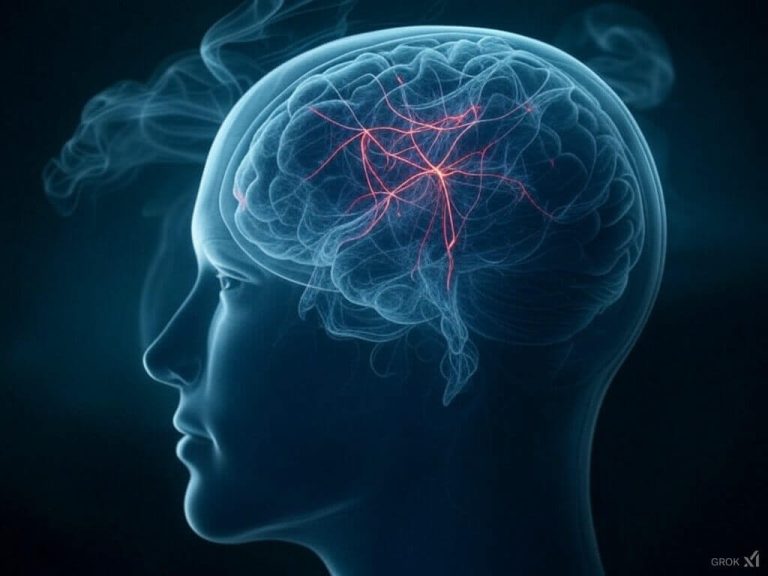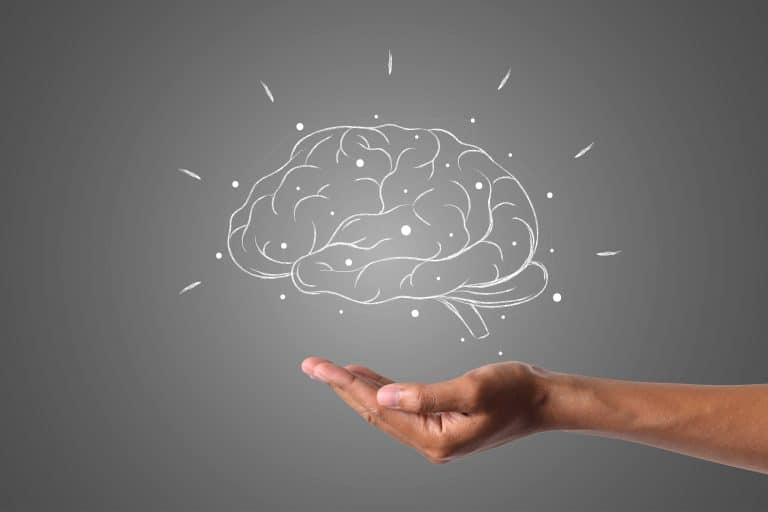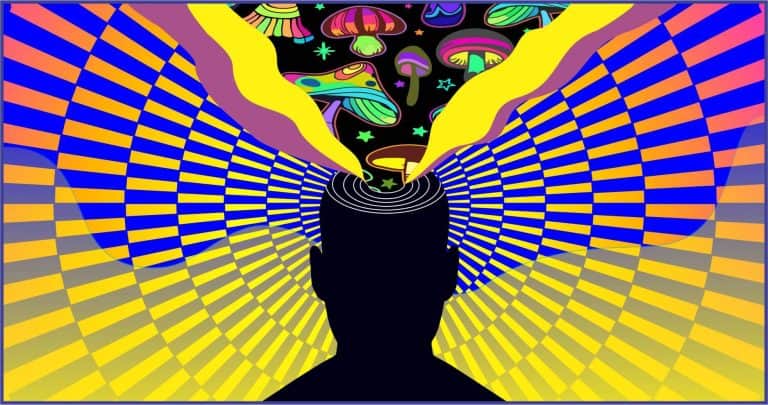Public opinion on the effects of cannabis is all over the place—and even within the medical community, the debate rages on. Is it a natural remedy or a cognitive liability? A powerful pain reliever or a double-edged sword?
One thing is clear: cannabis has been a game-changer for pain management, especially for those suffering from arthritis, neuropathy, and migraines. I saw this firsthand with my grandfather, who relied on cannabis to ease the relentless pain of prostate cancer.
Beyond pain relief, there’s growing evidence that cannabis may help with anxiety and PTSD by modulating cortisol and serotonin levels. But here’s the catch—tinkering with our delicate hormone and neurotransmitter systems isn’t without risk. Short- and long-term effects on brain function remain a hot topic of research.
With cannabis use and legalization expanding worldwide, understanding its impact on brain health and cognitive performance has never been more crucial. Thankfully, a groundbreaking 2025 study published in JAMA Network Open sheds new light on this question.
In this article, we’ll break down the key findings from the study on cannabis use and its effect on the brain and what they might mean for you. Whether you’re a health enthusiast, a cannabis user, or simply curious about brain health, this deep dive will help you separate fact from fiction and make informed choices, based on what the latest research shows.
The Study
The cross-sectional 2025 study aimed to explore the effects of lifetime cannabis use on brain activation during cognitive tasks in 1,003 young adults, representing a fairly good sample size.
The primary of the study focus was to determine whether recent and lifetime cannabis use was associated with differences in brain function during various cognitive tasks.
Participants were categorized based on the frequency of their cannabis use. Heavy lifetime users were classified by more than 1,000 uses of cannabis, moderate lifetime users by between 10 to 999 uses, and mon-users by fewer than 10 uses of cannabis.
Brain activation was measured during a series of seven tasks performed during a functional MRI (fMRI) session, which included the following cognitive tasks:
- Working memory
- Reward processing
- Emotion processing
- Language processing
- Motor tasks
- Relational assessment
- Theory of mind
The fMRI data aimed to assess brain function across these different cognitive tasks to see whether cannabis use, both recent and lifetime, had any impact on brain activation patterns during these tasks.
The study also adjusted for recent cannabis use by removing participants who had consumed cannabis shortly before the testing, ensuring the results were not skewed by being under the influence.
The Results – How Does Cannabis Affect the Brain?
1) Brain Activation
One of the most significant insights of the study was the finding that heavy lifetime cannabis use was linked to lower brain activation, especially during working memory tasks.
The relationship between cannabis use and brain activity wasn’t simple or predictable. It didn’t just decrease in a straight line as use increased but instead, the effect followed more of a curve where brain activity tended to lower with more cannabis use, but not in a perfectly consistent way.
The researchers checked their results using a statistical test and found that this curved pattern was not due to random chance. The likelihood that this finding was purely coincidental was very low (about 2% after adjusting for multiple tests), which means the relationship is likely real and meaningful.
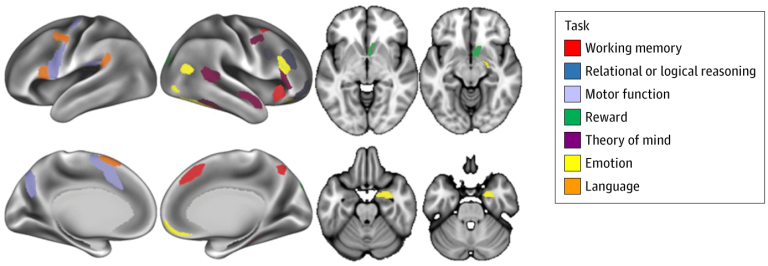
2) Effect on Working Memory
One of the clearest findings in this study was that heavy lifetime cannabis use was linked to lower brain activity during a working memory task. Even after researchers excluded people who had recently used cannabis, the effect remained—suggesting that long-term cannabis use might have a lasting impact on how the brain processes and stores information.
The brain regions most affected were the dorsolateral prefrontal cortex, dorsomedial prefrontal cortex, and anterior insula. These areas are packed with CB1 receptors, which THC interacts with. Studies have shown that regular THC exposure can actually reduce the number of these receptors over time, potentially making it harder for these parts of the brain to function at full capacity.
Interestingly, brain activation during this memory task was also linked to intelligence, education, and verbal memory performance. In other words, the more cannabis someone has used in their lifetime, the lower their brain activity in these key areas—potentially impacting their overall cognitive ability.
Recent cannabis use was also tied to lower brain activation during both working memory and motor tasks, but after adjusting for multiple comparisons, the effect didn’t hold up. This suggests that while short-term cannabis use might temporarily affect brain function, the long-term, cumulative effects of heavy use are more concerning.
Another interesting takeaway? Researchers found no link between a cannabis dependence diagnosis and brain function, which suggests that it’s not necessarily addiction or dependence causing these changes—it’s the actual exposure to THC over time.
The key takeaway here is if you’re doing something that requires strong working memory—like studying, problem-solving, or making complex decisions—long-term cannabis use could make it harder for your brain to perform at its best. Whether or not these effects are reversible with long-term abstinence is still up for debate, but one thing is clear: the more cannabis you use over time, the greater the potential impact on your cognitive abilities.
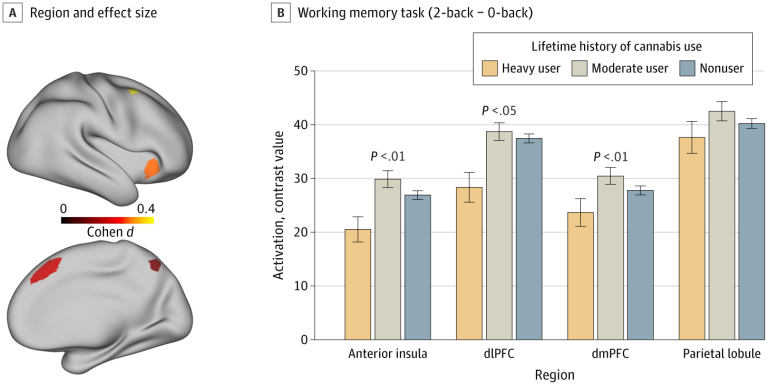
3) Theory of Mind Task
One of the more intriguing findings in this study was that recent cannabis use was linked to lower accuracy on a theory of mind task.
Theory of mind (ToM) measures a person’s ability to understand and predict the thoughts, beliefs, emotions, and intentions of others. In other words, it’s the mental ability that allows us to put ourselves in someone else’s shoes and recognize that they might have different perspectives, knowledge, or feelings than we do.
The study found that recent cannabis use was associated with lower behavioral accuracy on the theory of mind task, but the brain activation differences for both recent and heavy lifetime cannabis users did not reach statistical significance after corrections for multiple comparisons.
Reduced brain activation during theory of mind tasks has been observed in other research on cannabis users, showing that cannabis users tend to have lower brain activation in areas responsible for social cognition.
Some scientists have even suggested that this could play a role in the increased risk of schizophrenia among cannabis users, as schizophrenia is often associated with major deficits in understanding social cues and other people’s perspectives.
A second takeaway from the study was that dampened brain activity during social processing tasks might help explain why some cannabis users experience paranoia, misinterpret social interactions, or withdraw from social settings—especially when consuming high-THC products. If your brain isn’t fully engaged in processing social information, it might be easier to misunderstand situations or misread intentions.
While more research is needed, these findings raise an interesting question: Could heavy or frequent cannabis use make it harder to connect with others on a deeper level? If social intelligence and emotional awareness are important in your work, relationships, or everyday life, it might be worth considering how cannabis affects your ability to read and respond to social situations.
Cannabis Effects Vary From Person to Person
Like many substances, from medication to food types, the effects of cannabis use vary significantly from person to person. Certainly, some seem to be more predisposed to the effects of tetrahydrocannabinol (THC) than others. Before we make any concrete conclusions, therefore, it’s important to note that all results drawn from the study are subject to large variances in personal tolerances.
Given the cognitive effects of cannabis and the disruption of the endogenous cannabinoid system by THC, it may be that brain regions with high cannabinoid 1 (CB1) receptor density might be altered more significantly by cannabis.
For example, there is evidence that cannabis use among adolescents is negatively associated with the thickness of the left prefrontal cortex (PFC) and right PFC and that the spatial pattern of cannabis-related cortical thinning is related to CB1 receptor density.
Many studies have found that women tend to experience more pronounced changes in brain structure compared to men. For example, studies have shown that women with cannabis dependence have smaller volumes in areas like the orbitofrontal cortex and cerebellum compared to men with the same condition.
Women may be more sensitive to the effects of cannabis, as evidenced by studies showing a blunted neural response to stimulant challenges in female cannabis users compared to their male counterparts.
It was particularly interesting, therefore, that this 2025 JAMA study shows lower brain activation in certain tasks when using cannabis, particularly in motor tasks. For example, a study found that men showed lower brain activation during motor tasks when they had THC in their system, while women did not show the same effect. Again, this highlights the variability of cannabis’s effects on different groups of people.
Conclusion – What Does This Mean for You?
So, what does all of this mean for you in simple English? The JAMA study brings some important points to keep in mind. If you’re a heavy, long-time cannabis user, it could affect your brain’s ability to perform well on tasks that require working memory—like problem-solving, decision-making, and maybe even remembering where you left your keys. Regular, heavy use may even have lasting effects, making it harder for your brain to get back to full speed, even if you take a break.
But don’t panic just yet! Moderate use probably won’t have the same long-term impact. If you’re using cannabis more casually, you’re less likely to experience these cognitive dips. The key takeaway here is moderation—using cannabis wisely and in moderation can help you avoid these potential pitfalls.
Also, some of the study’s findings about social cognition, such as reading the room or understanding other people’s emotions, might make you think twice about how cannabis affects your interactions. While it’s still a bit of a gray area, it’s something to consider if you’re someone who thrives on connecting with others.
Remember, everyone reacts to cannabis differently. Whether you’re a seasoned user or a newbie, it’s important to listen to your body and stay aware of how cannabis affects you. So, if you feel your brain struggling to keep up or find yourself misreading social cues, it might be a sign to cut back a little.
FAQs
Is cannabis bad for mental health?
Cannabis may help with anxiety and PTSD by modulating cortisol and serotonin levels. But here’s the catch—tinkering with our delicate hormone and neurotransmitter systems isn’t without risk. Short- and long-term effects on brain function remain a hot topic of research.
Does cannabis reduce brain activation?
One of the most significant insights of the study was the finding that heavy lifetime cannabis use was linked to lower brain activation, especially during working memory tasks.
Does cannabis use affect memory?
One of the clearest findings in this study was that heavy lifetime cannabis use was linked to lower brain activity during a working memory task. Even after researchers excluded people who had recently used cannabis, the effect remained—suggesting that long-term cannabis use might have a lasting impact on how the brain processes and stores information.
